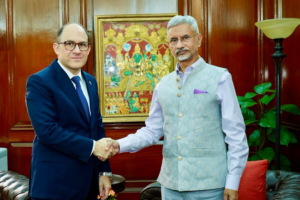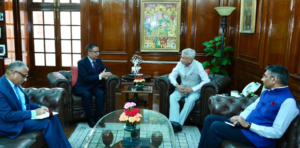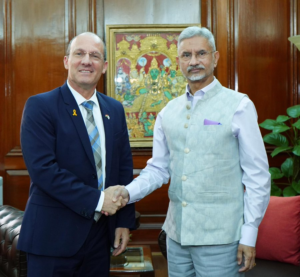“Discussion, debate, deliberation were always part of Inda’s ethos and culture”: Union Minister Nadda
New Delhi [India], December 17 (ANI): Union Minister JP Nadda on Tuesday highlighted that India’s Constitution has drawn inspiration from country’s ethos and culture.
Speaking on the Constitution debate in the Rajya Sabha, he stated that discussion, debate, and deliberation were always part of the country’s ethos and culture.
“The makers of the constitution were aware that this is not a nation in the making; it was already a nation. This nation was based on our culture, our ethos; that’s why the debates of the constituent assembly mention our culture and history,” Nadda said.
Reflecting upon India’s ancient scriptures he noted that the terms like ‘Sabha’, ‘Samiti, and ‘Sansad’ are mentioned in those texts.
“If we talk about the Rigveda, Atharvaveda, and old manuscripts, we notice that the words like ‘Sabha,’ ‘Samiti, and ‘Sansad’ have been used,” the Rajya Sabha member stated.
“It shows discussion, debate, and deliberation are there in our ethos and culture,” the Rajya he added.
Nadda reiterated that India is not just the largest democracy but also the mother of democracy.
“This festival that we celebrate in a way strengthens our dedication towards the constitution, our commitment towards the constitution. I believe that we will make good use of this opportunity to fulfil the national goal. We all know that India is the largest democracy, but as our Prime Minister said, it is not only the largest democracy, but it is the mother of democracy,” the BJP president said.
He said that the original copy of the Constitution had the imprint lotus, stating that the flower reflects the fact that after the struggle for freedom, the country stood with the new Constitution.
“When we talk about culture, many people feel that we are not progressive. I want to bring to their attention that the original copy of the Constitution also had the imprint of the caves of Ajanta and Ellora. We also see an imprint of a lotus on it. The lotus reflects the fact that after coming out of the mud and swamp and fighting for freedom, we are ready to stand with a new morning and stand with the new Constitution,” he said.
He went on to say that the Constitution also inspires us to work towards strengthening democracy despite challenges.
Further taking a dig at the opposition Congress, the Union Minister appealed to the party to join Anti-Democracy Day, which he stated will be observed next year to mark the 50th anniversary of the emergency.
“It will be 50 years next year since the Emergency was imposed. We will celebrate Anti-Democracy Day. The Indian National Congress should join in and appeal to the people that for 50 years. There was an evil attempt to strangle democracy during the emergency. If you have any mercy for them anywhere in your heart, if you have any remorse anywhere in your heart, then I appeal to you that you must join Anti-Democracy Day on 25th June 2025,” Nadda said.
Further sharpening his attack on Congress, he claimed that the 35A was brought in 1954 through a Presidential Order and 35A was given Presidential status without a debate in the Parliament.
“In Article 370, 35A was brought in 1954 through a Presidential Order and 35A was given Presidential status that too without a debate in the Parliament. Nowadays there is a lot of discussion about democracy but you bring 35A in Article 370, through a Presidential Order and you don’t even debate on it. 35A defined who would be the citizen of Jammu and Kashmir. Only those would be considered a citizen who lived before 1944…One work was given to Prime Minister Jawaharlal Nehru and we all saw it in the form of Article 370 and 35A from the back door. The impact of Article 370 was never discussed,” he added.
“106 laws passed by the Indian Parliament were not applicable in Jammu and Kashmir, which includes the Prevention of the Atrocities Act, Human Rights Act. You will be surprised to know that POCSO was not implemented in Jammu and Kashmir. Jawaharlal Nehru was the biggest advocate of the right to property of women, but it was not implemented in Jammu and Kashmir. You will also be surprised to know that if a Kashmiri sister got married to a non-Kashmiri, she was also deprived of property rights,” Nadda stated.






